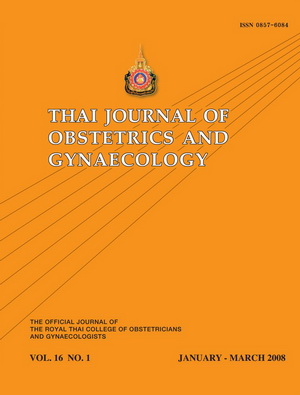Outcome of HIV-infected Pregnancy with Antiretroviral Therapy at Chonburi Hospital between 2002-2006
Main Article Content
Abstract
Objectives To compare the pregnancy outcomes in HIV type 1- infection women between good compliance to antiretroviral therapy group and poor compliance therapy group.
Methods Three hundred and twenty one HIV type 1- infected pregnant women were included in a historical cohort study at Chonburi Hospital. The outcome of their pregnancy was compared between good compliance to antiretroviral therapy group and poor compliance group.
Results The prevalence of HIV- infected pregnant women was 1.3% (321/25,012) in our hospital. Antiretroviral therapies were prescribed to all patients. There were two groups of therapy; good compliance group, 235 cases (73.2%) and poor compliance group, 86 cases (26.8%). The outcome of pregnancies (gestational age at delivery, birthweight, Apgar score, neonatal intensive care admission and neonatal death) were compared between the two groups. The good compliance therapy group had less preterm birth (16.6% vs 20.9%, p = 0.37), less low brithweight (15.3% vs 36%, p = 0.001), less low Apgar score (0.4% vs 10.5%, p = 0.003), less neonatal intensive care admission (0% vs 7%, p = 0.01) and less neonatal death (0.4% vs 5.8%, p = 0.002) than the poor compliance therapy group.
Conclusion HIV-infected pregnant women with good compliance to antiretroviral therapy had less bad outcome of pregnancy than the poor compliance therapy patients.


